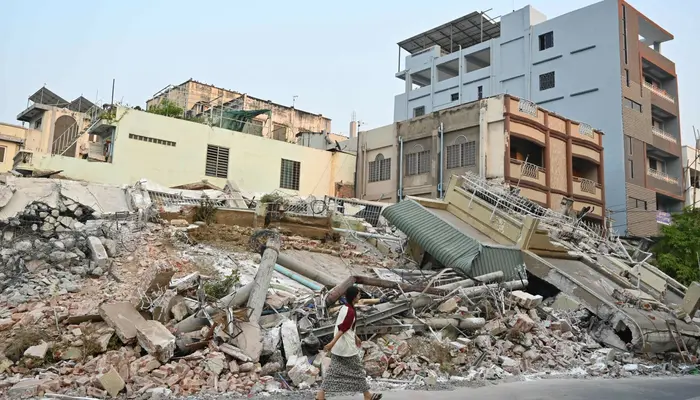Cyclone Asna has moved away from Sindh’s coast, sparing Karachi from a direct hit under the protection of Abdullah Shah Ghazi. As of Saturday, the cyclone was about 200 kilometers away from Karachi, heading further away from Pakistan’s coastline. Despite this, residents of Karachi and surrounding areas are preparing for the heavy rains that the weather system is expected to bring.
Cyclones are atmospheric disturbances that form around low-pressure areas and are characterized by rapid and destructive air circulation. These weather systems often bring violent storms and heavy rainfall. The North Arabian Sea, which borders Pakistan, has been the origin of several cyclones over the years.
legendary Sufi saint, Abdullah Shah Ghazi
The city of Karachi has historically been spared from direct cyclonic impacts. Many locals believe that this is due to the protection of the legendary Sufi saint, Abdullah Shah Ghazi, whose shrine stands in the city. This belief, deeply rooted in the local culture, has persisted for generations. However, meteorological data suggests that while Karachi has avoided direct hits, Pakistan’s coastal regions have experienced significant cyclonic activity over the past century.
Historically
According to historical data, several cyclonic storms have impacted Pakistan’s coastal areas, including the years 1895, 1902, 1907, 1948, 1964, and 1985. The most recent cyclones to affect Pakistan include Cyclone Shaheen in September 2021, which brought gusty winds and rainfall to Karachi, and Cyclone Biparjoy in June 2023, which made landfall near the Pakistan-India border.
Although Karachi has never experienced the full force of a cyclone, the city has faced the effects of nearby storms. For instance, Cyclone Shaheen caused one fatality in Orangi Town due to electrocution from the gusty winds and rain that swept through the city. These events serve as reminders of the potential dangers posed by such weather systems, even if they do not directly hit the city.
Cyclones occur due to atmospheric disturbances around low-pressure areas, typically over warm ocean waters. The warm, moist air rises and creates a vacuum that pulls in cooler air, leading to the formation of powerful winds that rotate around the low-pressure center. When these systems strengthen, they can develop into cyclones, bringing severe weather conditions, including heavy rainfall, strong winds, and storm surges.
Pakistan Meteorological Department Warnings
In the case of Cyclone Asna, the Pakistan Meteorological Department has issued warnings about the possibility of heavy rains and strong winds in Karachi and other coastal areas. Authorities have urged residents to take precautions, avoid unnecessary travel, and stay indoors during the peak of the storm. Emergency services have also been put on alert to respond to any incidents that may arise due to the heavy rains.
As Karachians brace for the weather system’s impact, the city’s past experiences with cyclones serve as a reminder of the importance of preparedness and caution. While Cyclone Asna may not directly hit Karachi, the heavy rains it brings could still disrupt daily life and pose risks to the city’s infrastructure.
The situation remains fluid, and residents are advised to stay updated on weather forecasts and follow any advisories issued by local authorities.
Follow us on Instagram, YouTube, Facebook, Whats App, and TikTok for latest updates.




















